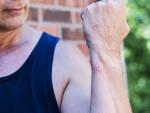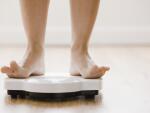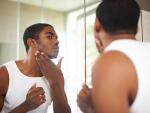
When I was 7 years old, I was diagnosed with psoriasis, a chronic autoimmune disease that covers your skin in scaly plaques. There weren’t a lot of treatments available to me at the time because I was so young, and to make things worse, my psoriasis was constant—it wasn’t the type that flares and then fades every so often. And it was everywhere: I have been 90% covered with psoriasis plaques almost my entire life, from my toes to my shoulders. In those early days, I tried different treatments, like topical steroids and vitamin D, as well as phototherapy. But nothing worked. My psoriasis was here to stay.
When I was first diagnosed in elementary school, I didn’t care as much about my appearance; I’d still wear shorts, short-sleeved shirts and swimsuits. But in middle school, I started to notice that my body looked different from other people—and they were letting me know that, too. Kids can be really cruel at that age. I remember being at swim class when other kids not-so-nicely asked me what was on my skin. I told everyone it was just eczema, because I figured they knew what that was but wouldn’t have any idea about psoriasis. I didn’t want to have to constantly explain about my disease, so I stayed covered up. Although I dreaded the summer months, I decided I’d rather have people ask me why I was wearing long clothes in the heat than ask me what was wrong with my skin.
As I grew up, my anxiety about my psoriasis limited me. I’m really tall and I would have loved to play basketball or volleyball, but I shied away from anything that would require me to show my skin. I remember having panic and anxiety attacks when I couldn’t cover up. When I had to wear a short-sleeve shirt, I’d spend the whole time worried that someone was looking at my arms and I would hide them behind my back. I was always looking at people to see if they were looking at me. Now, I realize I had severe anxiety, and it wasn’t the only way that psoriasis affected my mental health.
I was very depressed at times. My depression would come and go, and the only way I could get through the hard times would be to try not thinking about my psoriasis; I pushed it to the back of my mind. But during those periods when I felt depressed, I was very sad about how I looked and whether or not people found me attractive—because I didn’t find myself attractive.
I never even told my friends what I was going through. They knew something was going on, but they didn’t pressure me to tell them more. It’s hard to believe that I kept such a big secret from so many people, all because I was afraid of what they would think.
This continued on through the years, as treatment after treatment didn’t work. Psoriasis always played a role in shaping my life—it was like a family member you can’t stand but you can’t get rid of.
My First Step Forward
When I was a junior in high school, about 16 years old, I decided I wanted to enter a local beauty pageant. It was totally out of character for me—I can’t tell you what I was thinking, but now I realize it was all part of my story. I was able to cover up as we rehearsed for the big day, and I just kept telling myself that I would worry about exposing my skin when I got to that point. When it was time for the final rehearsal, I had a panic attack. We all had to put on our dresses, and I couldn’t hide my skin anymore. No one knew about my psoriasis, and I couldn’t imagine everyone seeing my body covered in plaques.
I finally told my grandmother how upset I was and she immediately went to buy some body makeup and flesh-toned stockings. I remember thinking, “I don’t know how this is going to work.” But in the end, it did the trick—and I even won the pageant.
Looking back at that moment, I can’t help but wonder how many other things I could have been successful at had I not allowed my psoriasis to stop me. The funny thing is, the pageant didn’t immediately change how I felt about my body—I still covered up and hid my condition from others until my early 20s. But my drive to enter the pageant showed me there was something inside me that wanted more. Now, I’m almost 30 and have learned a lot about what’s important to me. Fortunately, I’ve found a medication that cleared up my psoriasis about 80 to 90%. But I still live with this disease every day, and my passion is advocating for psoriasis awareness—I want others with this disease to know they’re not alone, and there’s no reason to hide.
Alisha Bridges, 29, aptly calls herself the Psoriasis Slayer; a devoted advocate for psoriasis awareness, she writes her own blog, Being Me in My Own Skin, as well as other health publications and organizations around the world. She’s also a National Psoriasis Foundation Community Ambassador and organizer of the First Walk to Cure Psoriasis in her adopted city of Atlanta, Georgia.










